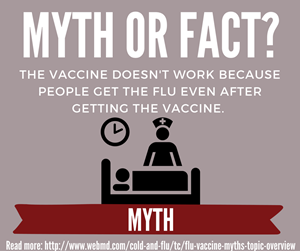
By Kenneth D. Bird, M.D., Fresno County Public Health Officer
Every year the flu kills 5,000-49,000 people in the U.S. depending on how virulent the flu strains are and on how many people get a flu vaccination.
Vaccinating against the flu is the number one way to prevent, or lessen the severity of this debilitating and sometimes deadly disease. Yet only half of all children and adults over 50 get a flu vaccination, according to the CDC. For adults aged 18-49, less than 32% get vaccinated – even though they’re most likely to be caretakers and infecting the most vulnerable populations, children and the elderly.
These vaccinations are easy to obtain, but a wide variety of mythical excuses for not doing so abound and seem to circulate as widely this time of year as does the flu itself. Let me debunk a few of the most common misconceptions.
Myth #1: Flu shots cause the flu.
 No, a flu shot cannot cause flu illness. Flu vaccines either have viruses that have been 'inactivated' and cannot infect you, or they’re a recombinant influenza vaccine that contains no flu viruses at all. People who become ill after being vaccinated were exposed to flu or another respiratory virus before the vaccination and received the vaccination too late for it to be effective. It takes a week or two for the immune system to respond and the vaccine to become fully protective.
No, a flu shot cannot cause flu illness. Flu vaccines either have viruses that have been 'inactivated' and cannot infect you, or they’re a recombinant influenza vaccine that contains no flu viruses at all. People who become ill after being vaccinated were exposed to flu or another respiratory virus before the vaccination and received the vaccination too late for it to be effective. It takes a week or two for the immune system to respond and the vaccine to become fully protective.About 35% of the people polled recently by CVS believe this myth. Some people do get a low-grade fever and feel a bit achy as their immune system responds, but it’s short-lived and it is not flu.
Myth #2: I got it last year, so I don’t need another one.
Immunity from a flu vaccination wanes over several months and flu virus strains (which require different specific vaccinations) change frequently. The flu season starts in October and could last until May, if you receive a flu vaccine at the beginning of the year you will need another flu vaccine in October the same year.Myth #3: Flu vaccines can cause Alzheimer’s disease.
In fact the opposite is true. Older adults who are vaccinated have a lower risk of developing Alzheimer’s, according to a 2001 study in the Canadian Medical Journal. A study in JAMA (the Journal of the American Medical Association found annual flu shots reduced the risk of death from all causes for older adults.Myth #4: Flu shots contain dangerous ingredients like mercury and formaldehyde.
No, all the ingredients are safe. Some people with allergies to certain ingredients, such as eggs or gelatin, should ask their doctor about avoiding certain vaccines with those ingredients.Myth #5: Pregnant women shouldn’t get a flu shot.
It is especially important for pregnant women to get vaccinated since influenza can cause more severe illness in pregnant women as well as miscarriages.Myth #6: The flu doesn’t kill that many people; it’s a conspiracy by pharmaceutical companies to make huge profits.
Very little of pharmaceutical companies’ revenues are from flu vaccinations, but flu really does kill. Already one individual under age 65 in Fresno County and two in Tulare County this 2017-18 flu season have died from complications of flu so far. It’s not always the really young or the very old who succumb to influenza.Myth #7: It’s too late. Flu shots only work if you get them by November.
Absolutely not! Anytime during flu season is a good time to get a flu shot. The best time is before the flu season hits the Valley. But since the flu sticks around until April most years, you have plenty of chances to get really, really sick – and even be hospitalized or die from the flu.Please go get your flu vaccination now. It is not too late.
Click here to find a flu clinic near you.



